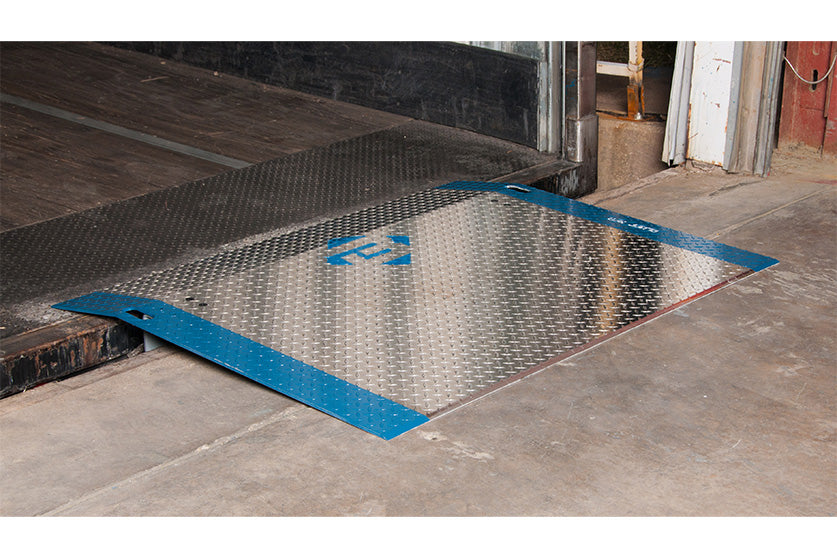The efficiency and safety of a warehouse often hinge on the type of equipment used for loading and unloading goods. Making the right choice in dock equipment can significantly affect your operations. This article will delve into two main types of dock equipment - Dock Plates and Dock Levelers - to help you decide which is more suitable for your specific needs.
Brief Overview of the Importance of Choosing the Right Dock Equipment
Choosing the right dock equipment is crucial for several reasons:
- Safety: The wrong equipment can lead to accidents, putting your staff at risk.
- Efficiency: The right equipment can speed up the loading and unloading process.
- Cost-Effectiveness: Long-term costs can be lower with the appropriate equipment.
- Compliance: Meeting legal requirements, such as OSHA standards, is essential for any business.
Introduce the Two Main Types of Dock Equipment: Dock Plates and Dock Levelers
The two primary types of dock equipment are Dock Plates and Dock Levelers. Both serve the purpose of bridging the gap between the dock and the truck, but they are suited for different types of operations.
What is a Dock Plate?
Description
A Dock Plate is a flat piece of metal that serves as a ramp between the dock and the truck.
Materials Used
These are typically made from aluminum or steel.
Load Capacity
They generally have a lower load capacity than Dock Levelers - suitable for hand trucks or pallet jacks.
Portability
Dock Plates are portable and can be moved easily.
When It's Most Appropriate to Use
These are ideal for operations with lower volume and lighter loads.
Pros and Cons
Pros:
- Portability
- Lower initial cost
Cons:
- Lower load capacity
- Less suitable for heavy machinery
B&P Manufacturing offers a variety of Dock Plates that are highly portable and efficient. For more on Dock Plates, check Source 4 Industries.
What is a Dock Leveler?
Description
A Dock Leveler is a piece of equipment that can be raised or lowered to match the height of the truck’s bed. Most have a loading dock spring installed.
Types
There are three types: mechanical, hydraulic, and air-powered.
Load Capacity
These generally have a higher load capacity and are suited for forklift operations.
Fixed Position
Dock Levelers are installed in a fixed position at the dock.
When It's Most Appropriate to Use
These are ideal for high-volume operations involving heavy loads.
Pros and Cons
Pros:
- Higher load capacity
- Suitable for heavy machinery
Cons:
- Higher initial cost
- Requires professional installation
Brands like Bluff Manufacturing offer high-quality Dock Levelers.
Key Differences
Load Capacity
Dock Levelers generally have a higher load capacity compared to Dock Plates.
Portability vs Fixed Position
Dock Plates are portable, whereas Dock Levelers are fixed.
Ease of Use
Dock Plates are generally easier to use but less versatile.
Cost
Dock Levelers are usually more expensive initially but may offer better value in high-volume operations.
Safety Considerations
Both types need safety measures like wheel chocks and barriers. Always refer to OSHA guidelines for compliance.
Which One is Right For You?
Volume of Usage
For high volume, Dock Levelers are preferable. For lower volume, Dock Plates can be sufficient.
Types of Vehicles Being Loaded/Unloaded
Dock Levelers are essential for larger vehicles and heavy machinery.
Types of Goods
Heavy goods require Dock Levelers, while lighter goods can be managed with Dock Plates.
Budget Considerations
If budget is a constraint, Dock Plates are generally cheaper.
Staffing
Dock Levelers may require professional operators.
Conclusion
In summary, Dock Plates are best suited for businesses that have lower volumes and smaller loads. Dock Levelers are ideal for high-volume, heavy-duty operations. Both have their pros and cons, but choosing the right one can lead to greater efficiency and safety in your warehouse.
For more quality products, take a look at Pioneer, which is also a trusted brand in dock equipment. And to learn more about the various types of dock equipment, don’t forget to read more articles at Source 4 Industries.







